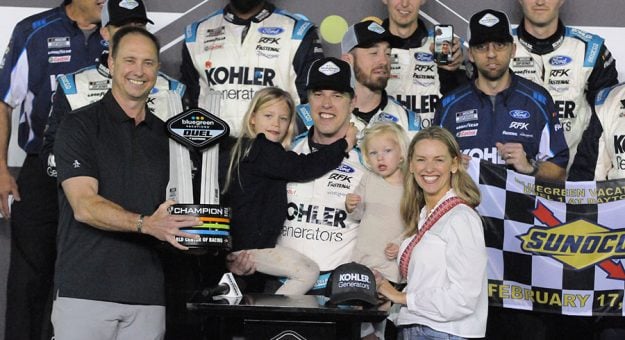When one chapter of your life ends, a chapter that lasted more than a decade, one would expect a lot of emotion to come with that.
For Keselowski, the process of emotionally transitioning from Team Penske as he prepared to move to Roush was made “significantly easier” due to the COVID-19 pandemic, which kept him from having a regular presence at the team’s shop.
“I would definitely say that COVID over the last year-and-a-half created an emotional detachment, no doubt,” Keselowski said. “Not that it made it easy. It made it easier. You don’t see the people that you worked with and cared so much about. I think that’s a lot of the Great Resignation to be quite honest.
“You don’t have your work family around you. When you leave somewhere you don’t feel like you’re leaving your friends because you pretty much already have.”
Not many NASCAR drivers would be expected to invoke a national labor movement (where employees resign from their jobs en masse) to better explain his situation. But Keselowski is known for being in-tune with the happenings of the world outside NASCAR’s bubble.
During the season finale at Phoenix Raceway, Keselowski compared the phases of his racing life to the different levels of schooling and the need for re-inventing yourself that comes with each step. But at the time he wasn’t sure what RFK Racing represented in that analogy.
“I stand by that message 100 percent,” Keselowski said a month later before giving an updated example.
“My father’s truck team was probably more like elementary school,” he said. “The time at JR Motorsports probably middle school and the time at Penske was probably high school, and now kind of working my way to university or college.”
Keselowski observed that “reinventing yourself is just part of the natural human process” and that “as a society, we expect growth out of people.”
When people “stop growing,” Keselowski views it as a “great tragedy in my mind, because we expect (growth) out of ourselves as well. And I think (RFK Racing) is just that, it’s an opportunity to grow that didn’t exist anywhere else. And that growth is on multiple fronts. That growth is in my commitment to the sport. That growth is in my knowledge of the sport. Because there’s a lot more doors that are open. And there’s growth in my ability to really help the sport and give back to it.”
Was Keselowski’s decision to leave Team Penske influenced by the feeling he had stopped growing there?
He kept his response decorous.
“I’d hesitate to say anything that could have negative connotations to Team Penske, because they were very good to me,” Keselowski said. “But naturally there’s a big difference between driving for a team and owning a team.”
There’s also a difference between the team Keselowski left and the one he now co-owns. While Team Penske is a perennial title contender, Roush hasn’t won a Cup Series points race since 2017 with Ricky Stenhouse Jr.
It has only two wins since Carl Edwards left the team for Joe Gibbs Racing after 2014.
For Keselowski, the biggest challenge for his new team based on where it’s coming from is “culture of expectations.”
“Dramatically growing our expectations of ourselves, that’s a big change,” Keselowski said.
When he walked into RFK Racing’s headquarters for the first as an owner on Nov. 11, Keselowski described the vibe of the team’s expectations as, “Entirely too low. I don’t know if there’s another way of saying that.”
He explained his approach to raising expectations by paraphrasing a quote from legendary football coach Vince Lombardi.
“Winning is not a once in a while thing, it’s an all the time thing,” Keselowski said. “It’s in every aspect of what we do. It goes from the way we bolt the cars together to how clean the shop is. It’s a culture of excellence that demands not perfection, but at least the pursuit thereof, that transcends every facet of who we are.”
How much of Keselowski’s vision is a product of the previous chapter in his life?
“I think there was a magnet for me at Team Penske when I first went there that came from some shared beliefs,” Keselowski said. “So I think I probably added to some of their beliefs and they probably added to some of mine. That was probably a big part of the success that we had together over the years.”
Thirteen years after their initial meeting, the magnet of ownership was strong enough to finally bring Keselowski and Roush together.
This chapter in their combined story is only beginning, but Keselowski is “enjoying it” so far.
“I can tell you that I feel like I’m making a difference and I’m really pleased by that.”
